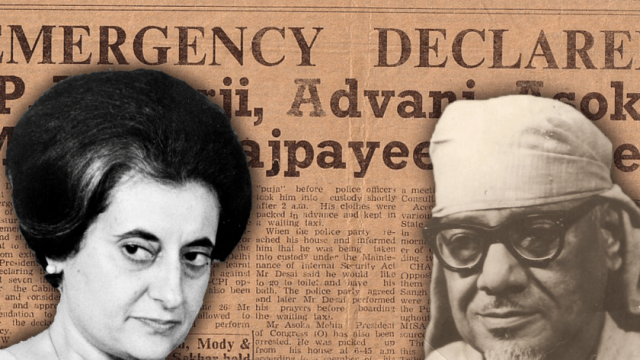The Case That Shook India: Indira Gandhi vs Raj Narain
There is no denying the fact that Indian courts have contributed more towards the development of law, doctrines and jurisprudence as compared to Pakistani courts in the past seven decades. The same is evident from the fact that most of the law books recommended by and for practitioners or law students in Pakistan are authored by Indians as well.
It is unfortunate that Pakistan’s apex court, uptil the 90s, delivered some of the worst and most criticized decisions in the country, such as in the Molvi Tamizuddin Khan case, the Dosso case, the Bhutto case, and the Usif Patel case, wherein the regrettable doctrine of necessity had also been introduced irrationally. However, it is also important to point out that our judiciary has mostly remained influenced or suppressed either by the legislators or the junta to be able to make more valuable contributions to the development of jurisprudence.
Let us have a look at a landmark judgment of the Indian constitutional courts delivered in Indira Gandhi v. Raj Narain reported as AIR 1975 SC 2299. The case was undoubtedly a watershed moment in the constitutional, legal and political history of India.
Brief Facts
Mrs. Gandhi was a candidate in the general elections from Rae Bareli, a city in the Indian state of Uttar Pradesh, and Raj Narain was the main opposition candidate she had been running against. In the election held on the 7th of March, 1972, Mrs. Gandhi won by a huge margin. Raj Narain, aggrieved of the election result, filed an election petition on the 24th of April, 1972, before the Allahabad High Court against Mrs. Gandhi, who had by then been elected as the Prime Minister of India.
Framing of Issues
After reviewing the written statement filed by Mrs. Gandhi, wherein she had denied all the allegations leveled against her, the court was pleased to frame the following issues:
- Whether Mrs. Gandhi had procured the services of Yashpal Kapoor for the furtherance of the prospects of her election while he was still a gazetted officer;
- Whether Yashpal Kapoor had bribed Swami Adwaitanand for the purpose of inducing him to contest as a candidate in the election;
- Whether at the instance of Mrs. Gandhi, members of the armed forces had arranged Air Force planes and helicopters for her, flown by members of the armed forces to enable her to address election meetings, and if so, whether it amounted to a corrupt practice under Section 123(7) of the Representation of People Act, 1974;
- Whether at the instance of Mrs. Gandhi and Yashpal Kapoor, the District Magistrate and Superintendent of Police of Rae Bareli had arranged for barricades, rostrums and loudspeakers for Mrs. Gandhi’s election meetings, and if so, whether it amounted to a corrupt practice under section 123 (7) of the Representation of People Act, 1974;
- Whether quilts, blankets, dhotis and liquor had been distributed by the agents and workers of Mrs. Gandhi in order to induce voters to vote for her; and
- Whether by using the symbols of cow and calf, Mrs. Gandhi had been guilty of making an appeal to religious sentiments and had therefore committed a corrupt practice under Section 123(3) of the Representation of People Act.
Proceedings
The framing of issues was followed by further interrogatories by the petitioner to the respondents and subsequent deletion of some of the issues by the honourable Allahabad High Court.
After the proper commencement of proceedings and at the stage of presenting evidence, Mrs. Indira Gandhi became the first Prime Minister in the history of India to attend (as a witness) court proceedings initiated against her by her political opponent on the basis of corrupt practices.
Raj Narain, the petitioner, was represented by Shanti Bhushan, senior counsel, while Mrs. Gandhi was represented by S.C. Khare, a senior lawyer of the Allahabad High Court and a staunch supporter and member of the Congress Party.
Both lawyers, utilizing their advocacy skills, argued brilliantly. Their arguments also serve as a good learning experience for legal practitioners and law students, and their examination and cross-examination of Mrs. Gandhi is especially worth reading.
The cross-examination of Mrs. Gandhi, which was a pivotal part of the proceedings, unveiled a number of secrets which exposed her apparently true story as false. The proceedings highlighted the following illegitimate tactics employed by Mrs. Gandhi to win the election:
- Using undeclared funds;
- Using government machinery;
- Seeking the services of government officials;
- Making amendments to the election law with retrospective effect to legitimize ill practices during the elections;
- Persuading voters by providing them with objects; and
- Violating laws and concealing facts.
Ruling
After a lengthy, twisted and exciting trial, the court announced that all the allegations leveled against Mrs. Gandhi had been proved. Such findings by the court against an incumbent not only contributed to the development of jurisprudence but also helped changed India’s political dynamics.
Allahabad High Court’s verdict declared Prime Minister Gandhi’s election void and ordered for her to be removed from her post. Mrs. Gandhi appealed but the decision remained unchanged before the Supreme Court of India as well.
The judgment has been viewed worldwide as a bold move by the Indian judicial system.
The views expressed in this article are those of the author and do not necessarily represent the views of CourtingTheLaw.com or any other organization with which he might be associated.


